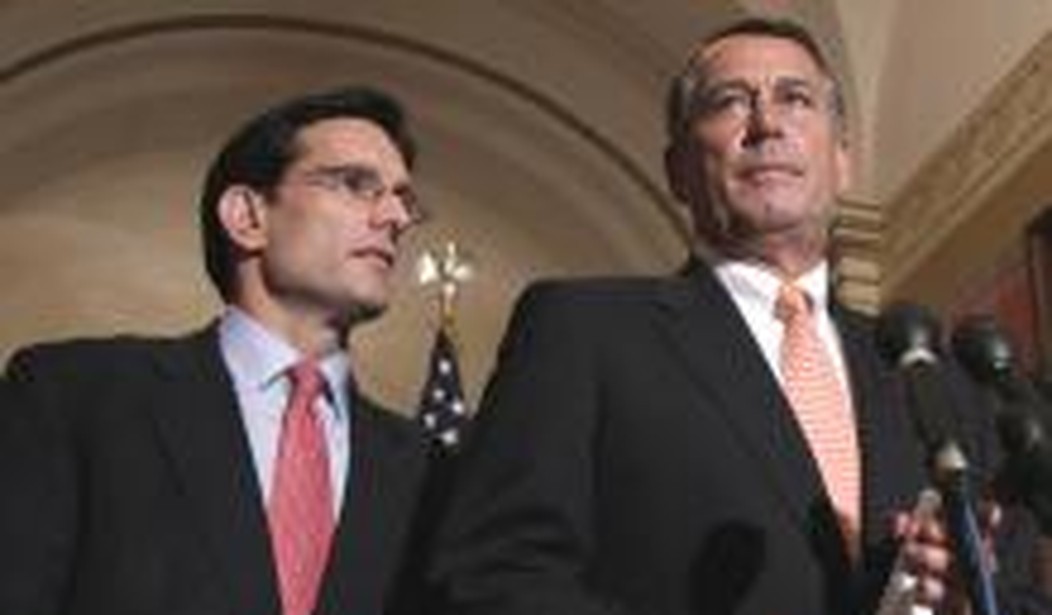For hours on New Year’s Day, it looked like the House Republican caucus would throw business as usual to the wind, throw a wrench in the Senate-approved tax-cut and sequestration deal, and plunge over the cliff in protest of the $4 trillion price tag in an absence of spending cuts.
GOP lawmakers reported dissension in the afternoon meeting to discuss the debt deal. Majority Leader Eric Cantor (R-Va.), without further explanation, told reporters that he did not support the Senate bill. There were rumors that the bill could even be pushed into Thursday — the beginning of the 113th Congress — to force negotiators to start all over with a slate of House-demanded amendments to cut spending.
But in the whip count to determine if the bill should be brought to the floor, GOP leadership whipped enough of the caucus — which recently dealt a humiliating blow to Speaker John Boehner’s (R-Ohio) Plan B compromise — into submission.
The bill passed 257-167 at 11 p.m., sending the deal to President Obama’s desk for a signature. The total included 151 Republican “nays” and 16 Democratic objectors.
Boehner voted “yes” in a rare speaker vote. Joining him was House Budget Committee Chairman Paul Ryan (R-Wis.) and conference vice-chair Cathy McMorris Rodgers (R-Wash.).
Cantor voted “no.” So did GOP Whip Kevin McCarthy (R-Calif.).
“Just voted NO,” Rep. Jason Chaffetz (R-Utah) tweeted during the vote. Republican Conference Chairman Jeb Hensarling (R-Texas) was another dissenter. Many members waited until the last minute to cast their votes.
In an hour of late-night debate, only House Oversight and Government Reform Committee Chairman Darrell Issa (R-Calif.) stood up in stark opposition to the bill.
“I’d like to be speaking for this bill, but I can’t,” Issa said, noting that he’s previously voted for every tax cut. “There’s $4 trillion of new debt and deficit and there’s no pay-for.”
He added that he does not believe the extension of the tax cuts will be followed by promised spending cuts. “I cannot bring myself to vote for it tonight,” Issa said.
House Ways and Means Chairman Dave Camp (R-Mich.) spun his support for the bill, which he called a “critical vote for the future of this country,” into a glass-half-full, noting it would make permanent the tax cuts originally crafted by his party.
“After a decade of criticizing these tax cuts, Democrats are finally joining with Republicans in making these permanent,” Camp said, promising his committee would pursue comprehensive tax reform in the next Congress.
Rep. Ed Royce (R-Calif.) argued that not passing the bill would deliver “a systemic shock to our already weak economy.”
No one from the GOP leadership spoke on the floor, and the Republicans yielded the debate to a parade of Democrats patting each others’ backs, chiding the GOP for not acting bipartisan enough, and urging passage of the deal.
“This package is vital for future deficit reduction efforts,” said Ways and Means Ranking Member Sander Levin (D-Mich.).
“This is no profile in courage for me to be voting for this bill,” said Rep. Charles Rangel (D-N.Y.). “We created this monster.”
Assistant Leader James Clyburn (D-S.C.) said he had issues with the bill, but was satisfied “it does contain the element of fairness.”
Clyburn lauded the bill as “a more progressive tax code than we’ve had in a very long time.”
Republicans who voted against the bill were quick to issue statements making their objections known.
“From my first day in the 112th Congress, I have been fighting hard to bring our spending in line with revenue. Sadly, that will have to wait until the 113th Congress,” said Rep. Todd Young (R-Ind.). “Despite the fact that this tax relief measure passed, time is running out for our nation to reign in reckless federal spending and reform our inefficient and unfair tax code.”
“While I support low tax rates for Americans and have previously voted to ensure taxes do not go up on hardworking Americans, I could not vote for this bill because it does nothing to reform our long-term spending problems, which are the real drivers of our debt and deficits,” said Rep. Rob Wittman (R-Va.). “In addition, this bill postpones sequestration, the disastrous defense cuts, for only two months. This creates even more uncertainty for our defense industry, which is so vital to the security of this nation.”
More objections were voiced by the chairman of the president’s deficit reduction commission, whose plan of tax reform and spending cuts was dismissed by Obama.
“The deal approved today is truly a missed opportunity to do something big to reduce our long term fiscal problems, but it is a small step forward in our efforts to reduce the federal deficit,” Erskine Bowles and former Sen. Alan Simpson (R-Wyo.) said in a joint statement.
“Washington missed this magic moment to do something big to reduce the deficit, reform our tax code, and fix our entitlement programs.”
And all acknowledged that we’ll be back here soon.
“The sequal #fiscalcliff2 is in 2 months,” tweeted Rep. Jared Polis (D-Colo.).









Join the conversation as a VIP Member